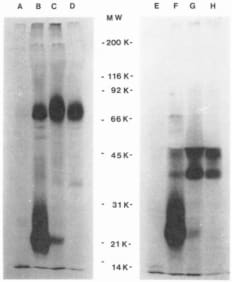Anti-CD3-associated TCR [WT31] monoclonal antibody
Invented by Johan van der Vlag
Invented at Radboud UMC
- Datasheet
- References (0)
- Inventor Info
Info
| Catalogue Number | 160532 |
| Applications | WB |
| Antigen/Gene or Protein Targets | human thymocytes |
| Reactivity | Human |
| Relevance | T cells are a type of immune cell, originating from hematopoietic stem cells, which are found in the bone marrow; however, the T cell matures in the thymus gland (hence the name) and plays a central role in the immune response. T cells can be distinguished from other lymphocytes by the presence of a T-cell receptor on the cell surface. |
| Host | Mouse |
| Immunogen | human thymocytes |
| Subclass | IgG1 |
| Myeloma Used | Sp2/0-Ag14 |
| Strain | Balb/c |
| Notes |
From Spits et al Journal of Immunology (Baltimore, Md. : 1950), 01 Sep 1985, 135(3):1922-1928 "Functional studies showed that WT-31 reacts similar to anti-T3 antibodies. It is mitogenic for resting T cells, blocks cytolysis mediated by alloantigenspecific CTL clones, and induces antigen-nonspecific cytolysis by CTL clones against Daudi target cells. WT-31 did not inhibit the formation of conjugates, but it blocked cytolysis just before or during the Ca*++-dependent programming for lysis. We conclude that WT-31 is an antibody that recognizes a common determinant on the T cell receptor for antigen. The present results support the notion that the two chains of the T cell receptor A) and B) form a functional protein ensemble with the three invariable T3 polypeptide chains. The T cell receptor epitope recognized by WT-31 is located close to the epitopes recognized by the anti-T3 reagents anti-Leu-4 and SPV-T3b but distal from the clonotypic T40/25 epitope. Functional studies showed that WT-31 reacts similar to anti-T3 antibodies. It is mitogenic for resting T cells, blocks cytolysis mediated by alloantigenspecific CTL clones, and induces antigen-nonspecific cytolysis by CTL clones against Daudi target cells. WT-31 did not inhibit the formation of conjugates, but it blocked cytolysis just before or during the Ca*++-dependent programming for lysis." |
| Research Area | Cancer, Immunology |
References
There are 0 reference entries for this reagent.
References: 0 entry
There is no reference for this reagent yet, feel free to use the button below to suggest one.
Add a reference
References: 0 entry
There is no reference for this reagent yet, feel free to use the button below to suggest one.
Add a reference



![Image thumbnail for Anti-CD3-associated TCR [WT31] monoclonal antibody](https://res.cloudinary.com/ximbio/image/upload/c_fit,fl_lossy,q_auto/24286f67-bc80-4fbc-b83c-c810ee7985e5.png)
![Image thumbnail for Anti-CD3-associated TCR [WT31] monoclonal antibody](https://res.cloudinary.com/ximbio/image/upload/c_fit,fl_lossy,h_45,q_auto/24286f67-bc80-4fbc-b83c-c810ee7985e5.png)

